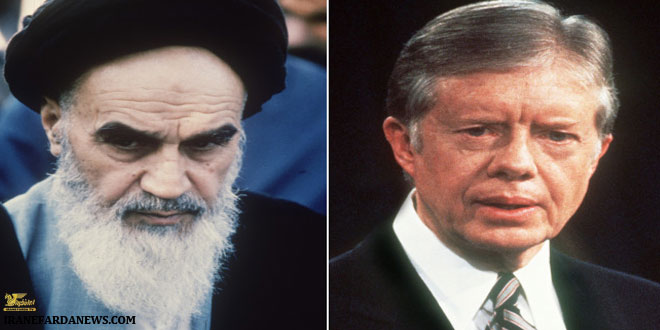
By John Bolton
New depths to Jimmy Carter’s fecklessness have emerged through the declassification of State Department cables relating to the fall of the Shah of Iran.
As reported by the BBC, the Ayatollah Khomeini, in January 1979, secretly sought Carter’s assistance in overcoming opposition from Iran’s military, still loyal to the shah. Khomeini promised that if he could return to Iran from exile in France, which the United States could facilitate, he would prevent a civil war, and his regime would not be hostile to Washington.
The soon-to-be Supreme Leader of Iran certainly knew a sucker when he saw one. What Carter did in response to Khomeini’s pledge is not entirely clear from the newly declassified materials, but Khomeini did return; the military either fell into line or was ruthlessly purged; and Iran switched 180 degrees from being a strategic US ally to being one of our most implacable adversaries.
Carter’s unwillingness to back the shah, a staunch American ally, has long been well-known, despite constant protestations of support at the time. Khomeini could not then, however, have relied on that for certain. Within Carter’s administration, hostility to the shah over his human-rights record, a centerpiece of Carter’s policy, was certainly extensive.
Iran thus posed one of the first clear tests of an American administration’s devotion to abstract principles over concrete US military and political interests.
The shah was no Jeffersonian democrat, but can anyone seriously argue that 35 years of authoritarian rule by religious extremists have been more favorable to human rights in Iran? And can anyone doubt that Iran’s seismic shift from being a strategic ally of the United States to being a terrorist-sponsoring nuclear proliferator has not left the Middle East and the wider world a more dangerous and unstable place?
The new documents, sadly, reveal how gullible an American president can be, how naïve and otherworldly and how oblivious to the real-world consequences of his decisions. Apparently, we have learned precious little from the shah’s overthrow.
Barack Obama’s 2015 deal with Khomeini’s successors over Iran’s nuclear-weapons program is a textbook lesson in getting our pockets picked diplomatically. Ayatollah Khamenei knew how to manipulate Obama just as Ayatollah Khomeini manipulated Carter. And the consequences could be even worse than the shah’s downfall.
The failures of the Iran nuclear deal are already all too evident. Iran’s ballistic-missile program continues unabated (providing delivery vehicles for nuclear weapons); Tehran is already renegotiating the deal to its advantage; and Iran’s malign influence in the Middle East continues to spread.
It comes as little surprise that Iran’s current Supreme Leader has already denounced the newly released documents as forgeries. After all, Ayatollah Khomeini’s 1979 efforts to secure American assistance dramatically undercut the urban legend that Khomeini was always implacably anti-American, the only attitude appropriate with regard to “the Great Satan.”
Of course, Khomeini’s unrestrained duplicity is hard to disguise for anyone with eyes to see. For a supposedly holy man, Khomeini brought new meaning to the saying, “The end justifies the means.”
What does defy credulity is that Jimmy Carter was so detached from reality that he would fall for Khomeini’s line of chatter, and that subsequent American leaders right down to the present day would do so as well. And it’s not just the American left that is taken in by such nonsense, but all too many Republicans as well. As Casey Stengel might have asked about Washington, “Don’t nobody here know how to play this game?”
The striking similarities between the naïve failures of both the Carter and Obama administrations should, in all seriousness, give us pause. Time and time again, in Iran and far more broadly, the United States fails to understand both its adversaries and their objectives.
Foreign governments of all sorts see negotiations not as a means to resolve mutual problems, but as a way to gain advantage over America. Like Carter, Obama has fallen prey to his illusions in ways that will harm our country for decades to come.
Especially in a presidential election year, it is important for American voters to ask themselves who they want to see bargaining with the likes of the ayatollahs. That is definitely a debate worth having.
John Bolton, now at the American Enterprise Institute, was the US ambassador to the United Nations from August 2005 to December 2006.
 khalijefars News, Blogs, Art and Community
khalijefars News, Blogs, Art and Community








